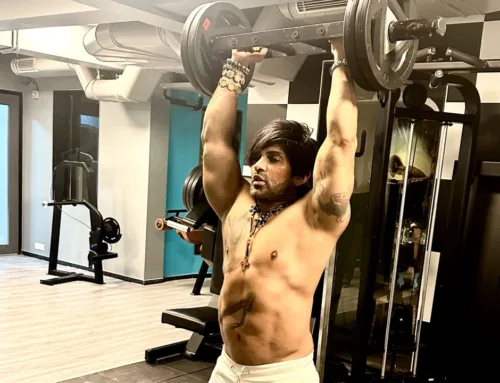Professional coaches and athletes are more aware than ever of the importance of nutrition for sportsmen. While there are many elements that affect an athlete’s overall performance in their chosen sport, eating is an important piece of the puzzle because it supplies the necessary energy. Sports nutrition is approached differently than general health nutrition.
In a recent event, Yash Birla with Sangram Singh at Padel Tennis Federation spoke about and highlighted the importance of nutrition for sportsmen. Being a renowned athlete, Sangram Singh shared a lot of his insights about diet and nutrition. This blog article offers some clarification on the importance of nutrition for sportsmen.
Nutrition in sports vs health
The study and practice of hydrating and fueling your body to enhance athletic performance is known as sports nutrition. Yash Birla explained that the ultimate objective is enhancing performance and reaching one’s full potential, and when correctly implemented, a scientific, person-centred nutrition plan can assist you in achieving that goal. Alongside the rising understanding of the importance of exercise for general health and awareness, sports nutrition has evolved over time. With the aid of greater science and study, nutrition in sports is currently expanding quickly and finding ever-new ways to help people run further, lift heavier, swim farther, or perform any other sport they choose just slightly better.
Benefits of sports nutrition
The diet that is best for athletes is not all that different from the diet that is best for healthy people in general, believes Mr Yash Birla. The advantages of nutrition in sports go beyond mere appearances, even though several sports require that the athlete fit a specific weight range or percentage of body fat.
- Enables longer and more intense training
- Delays onset of fatigue
- Keeps the immune system strong
- Enhances performance
- Improves recovery
- Improves body composition
- Reduces potential of injury
- Aids in focusing and concentrating
Nutrition in sports – basic overview
It is commonly known that an athlete’s diet can have an impact on how effectively they train, recover, and perform. We get our energy from the food and liquids we consume. The body must expend a particular amount of energy depending on our training methods and the sports we choose to play. Sports performance can be significantly impacted by food consumption in terms of quantity, kind, and time, explained Yash Birla and Sangram Singh. The needs of a person will differ depending on a wide range of variables, including age, genetics, gender, sport, and lifestyle.
Nutrition in sports – the foundation is behaviour & lifestyle
Any diet and training program’s base, core, and main focus must be outside of the gym, pitch, court, etc. The foundation is laid and you are prepared for success in all future elements by balancing stress and sleep, mobility, social interactions, recovery, and lifestyle to match your sporting ambitions. But it’s sometimes the most ignored or underappreciated. Consider this: The typical amateur athlete might work out in the gym for 1-2 hours five times per week. What occurs during the remaining 158 hours?
Nutrition in sports – macronutrients & hydration
Fat, carbohydrates, and protein are the three macronutrients that makeup food. The main objective of sports nutrition is to achieve a balance between these macro- and micronutrients for the best possible energy output and, occasionally, body composition for the targeted sport, says Yash Birla. The proportion of each that a person needs will vary depending on both internal and external aspects of their sport. For instance, a CrossFitter should avoid the ketogenic diet, but there are certain outliers in the sport that do well on a higher-fat diet. Additionally, the macronutrient requirements will change according to the training phases. For example, a conditioning phase may call for more carbs than a structural rebuild phase.
A sedentary person needs roughly 2-3 litres of water every day. However, depending on sweat production and training demands, an athlete’s hydration needs may drastically increase. Depending on body weight, exercise, and ambient factors, each athlete will have different specific fluid requirements. Hydration, however, extends beyond simple water consumption to include electrolyte balance, explained Yash Birla.
Nutrition in sports – micronutrients
The objective is to achieve appropriate micronutrient intake, including vitamins, minerals, phytonutrients, and other nutrients, in addition to balancing these macronutrients. It is crucial to note this because it is all too frequently overlooked. Micronutrients assist in maintaining a healthy body by assisting with a variety of processes including injury prevention, muscle development, immunological support, recuperation, and more. Once more, it’s very uncommon to observe people ignoring this in favour of empty calories, whether for the purpose of simply consuming enough calories (remember that some people may require a lot of food throughout the day) or the contrary, decreasing calories (to make weight).
Nutrition in sports – nutrient timing
The timing of nutrients starts to matter when it comes to sports nutrition and the goal of performance. It’s crucial to consider before, during, and post-nutrition if you want to get the most out of your workout, believes Yash Birla.
Additionally, other nutrient timing requirements that must coincide with game or competition day may exist. Once more, the prerequisite will vary on the person and the sport. This is also where, occasionally, it may force you to consider packaged energy options, such as energy gels, protein shakes, etc. Although it should be avoided whenever feasible, training for sports is distinct from training for health. At certain times, you want to isolate and maximise nutrients, which isn’t always achievable with entire foods.
Nutrition in sports – supplements
Whole foods and appropriate hydration are the cornerstones of a healthy diet, explains Yash Birla in his book “Building The Perfect Body.” However, the physical demands of training may necessitate additional support when it comes to sports nutrition. Again, the particulars of this will depend on personal wants and demands. This a reminder to always check the rules of your specific sport for what is permitted and prohibited. Finally, remember that you get what you pay for. The multi-billion dollar supplement market is massive and mostly unregulated. Ask inquiries, use independent third-party research, and pick your supplements wisely!
Who can benefit from sports nutrition?
Yash Birla asserts that it’s crucial to meet your energy needs from entire food sources if you want to function and perform at your best! Examining sports nutrition is beneficial for everyone, not just top athletes. Undoubtedly, more and more people are pushing their training to the limit by participating in triathlons, marathons, and obstacle courses.
Fitness enthusiasts and professionals are eager to update and improve their understanding and practice as “one-size-fits-all” methods to weight control, sports performance, and healthcare quickly give way to more effective personalised ways.






[…] Importance Of Nutrition For Sportsmen […]